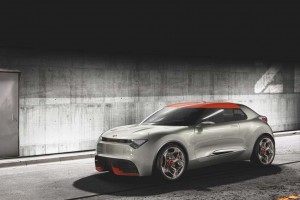Korean carmaker Kia has touched off an unanticipated firestorm with the debut of its Provo concept vehicle at this year’s Geneva Motor Show.
Finding a suitable name for a vehicle is never easy, usually because the best choices are already taken, but occasionally because they might carry some inadvertently negative meaning. In the case of the Provo, a British lawmaker has gotten fired up because Provo was the street name for the Provisional IRA.
That was the violent arm of the outlawed Irish Republican Army blamed for nearly 2,000 deaths during the period locals often refer to as “the troubles,” the 1970 to 1997 campaign of violence meant to win independence for the region from Britain.
It didn’t help that Kia – whose name can be seen as shorthand for “Killed in Action” – promoted the design concept vehicle as a “radical super-mini coupe which aims to set the streets alight.”
(For more on the Kia Provo Concept, Click Here.)
That led Gregory Campbell, a member of Parliament from Northern Ireland’s E. Derry to introduce a bill asking Kia to make sure it didn’t actually sell a car with the Provo name. His goal, MP Campbell said, was to “reinforce with Kia the seriousness of the issue and the need to deal with their customers in a sensitive manner.”
The red-faced automaker quickly made a U-turn. Though it was too late to re-badge the Kia Provo concept vehicle, it now promises it will not use the name on a production vehicle – certainly not when for sale on the British isles.
The lawmaker said he is pleased Kia “acted quickly,” adding the maker’s “decisive action will be welcomed by many people, in Northern Ireland and beyond, whose lives have been affected by the murderous actions of the Provisional IRA.
Along with actions in Northern Ireland, the “provos” were blamed for numerous bombings and murders in England.
The unexpected flap underscores the challenges carmakers face when they try to come up with new names. Perhaps the most famous example was General Motors errant decision to market its Chevrolet Nova small car in Latin American markets, unaware the name also could mean, “doesn’t go.” As the Associated Press noted, the Mazda LaPuta could be translated into “the whore,” while the Honda Fitta was interpreted by some Scandinavians to refer to a woman’s genitalia.
A whole industry has grown up around finding available and safe names, though Toyota ran into a snag when it launched its luxury brand Lexus in 1989. It was sued by the Lexis/Nexis news service, but after initially agreeing to a pay-off, Toyota led the case go to court where it ultimately won.
However, the maker backed down when Ford threatened to sue over the planned name for a new full-size pickup. The Detroit maker claimed Toyota’s T-150 was too close to the Ford F-150, long the best-selling vehicle in the U.S. The Japanese maker eventually decided to name its truck the Tundra.


That’s a really FUGLY looking car. It would appear that most politicians are braindead…
The Chevy Nova never meant “no go” in Spanish or any other language. The car sold well in Latin America; the story has been thoroughly discredited. I wrote about it here: http://www.duetsblog.com/2012/07/articles/branding/that-story-about-the-chevy-nova-its-a-no-go/
Hi, Nancy,
The Nova did all right in Latin America but nowhere near expectations. And, yes, I’ve heard people say the story was discredited but a simple run through a half-dozen online translators will validate that one of the primary meanings IS “doesn’t go.” How much did that matter? In the Latino culture, such things definitely can have an impact and I’ve had several marketing execs within GM itself admit that wasn’t the best choice of names. It’s one reason why makers now spend a fortune researching possibilities.
Paul A. Eisenstein
Publisher, TheDetroitBureau.com
Hi Paul,
There’s a significant different between “no va” (doesn’t go) and “nova” (a bright star). For one thing, they’re pronounced with different stresses; for another, “Nova” is an established brand name in many Spanish-speaking countries (the gasoline brand Pemex Nova, for example).
Moreover, it’s unidiomatic for a speaker of Spanish to say a car “no va” — he’d more likely say “no camina.”
GM *did* research the name and decided the risk was trivial.
See Snopes: http://www.snopes.com/business/misxlate/nova.asp